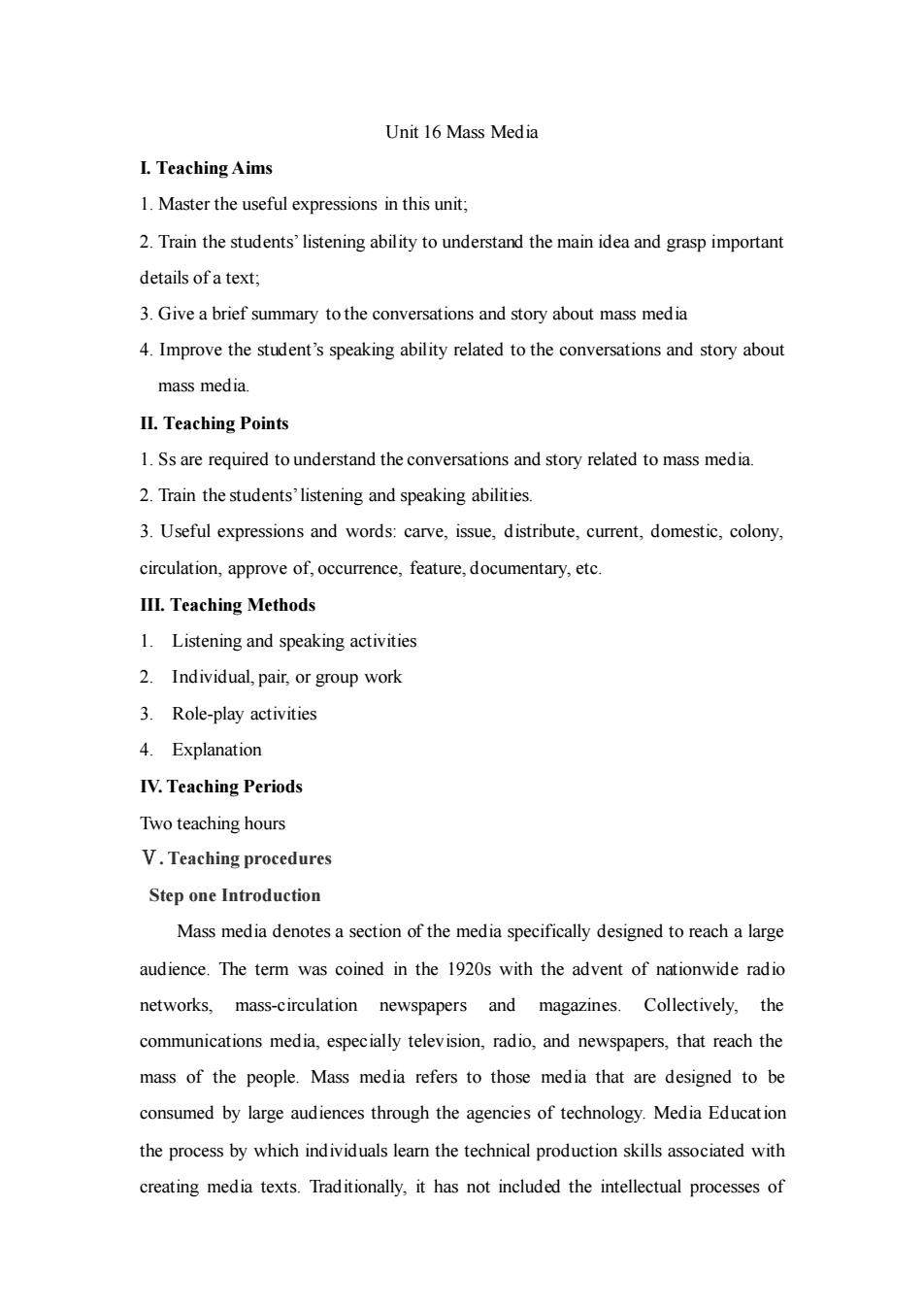
Unit 16 Mass Media LTeaching Aims 1.Master the useful expressions in this unit. 2.Train the students'listening ability to understand the main idea and grasp important details ofa text: 3.Give a brief summary to the conversations and story about mass media 4.Improve the student's speaking ability related to the conversations and story abou mass media II.Teaching Points 1.Ss are required to understand the conversations and story related to mass media 2.Train the students'listening and speaking abilities. 3.Useful expressions and words:carve,issue,distribute,current,domestic,colony, circulation,approve of,occurrence,feature,documentary,etc. .Teaching Methods 1.Listening and speaking activities 2.Individual,pair,or group work 3.Role-play activities 4.Explanation IV.Teaching Periods Two teaching hours V.Teaching procedures Step one Introduction Mass media denotes a section of the media specifically designed to reach a large audience.The term was coined in the 1920s with the advent of nationwide radio networks,mass-circulation newspapers and magazines.Collectively,the communications media,especially television,radio,and newspapers,that reach the mass of the people.Mass media refers to those media that are designed to be consumed by large audiences through the agencies of technology.Media Education the process by which individuals leamn the technical production skills associated with creating media texts.Traditionally,it has not included the intellectual processes of
Unit 16 Mass Media I. Teaching Aims 1. Master the useful expressions in this unit; 2. Train the students’ listening ability to understand the main idea and grasp important details of a text; 3. Give a brief summary to the conversations and story about mass media 4. Improve the student’s speaking ability related to the conversations and story about mass media. II. Teaching Points 1. Ss are required to understand the conversations and story related to mass media. 2. Train the students’ listening and speaking abilities. 3. Useful expressions and words: carve, issue, distribute, current, domestic, colony, circulation, approve of, occurrence, feature, documentary, etc. III. Teaching Methods 1. Listening and speaking activities 2. Individual, pair, or group work 3. Role-play activities 4. Explanation IV. Teaching Periods Two teaching hours Ⅴ. Teaching procedures Step one Introduction Mass media denotes a section of the media specifically designed to reach a large audience. The term was coined in the 1920s with the advent of nationwide radio networks, mass-circulation newspapers and magazines. Collectively, the communications media, especially television, radio, and newspapers, that reach the mass of the people. Mass media refers to those media that are designed to be consumed by large audiences through the agencies of technology. Media Education the process by which individuals learn the technical production skills associated with creating media texts. Traditionally, it has not included the intellectual processes of
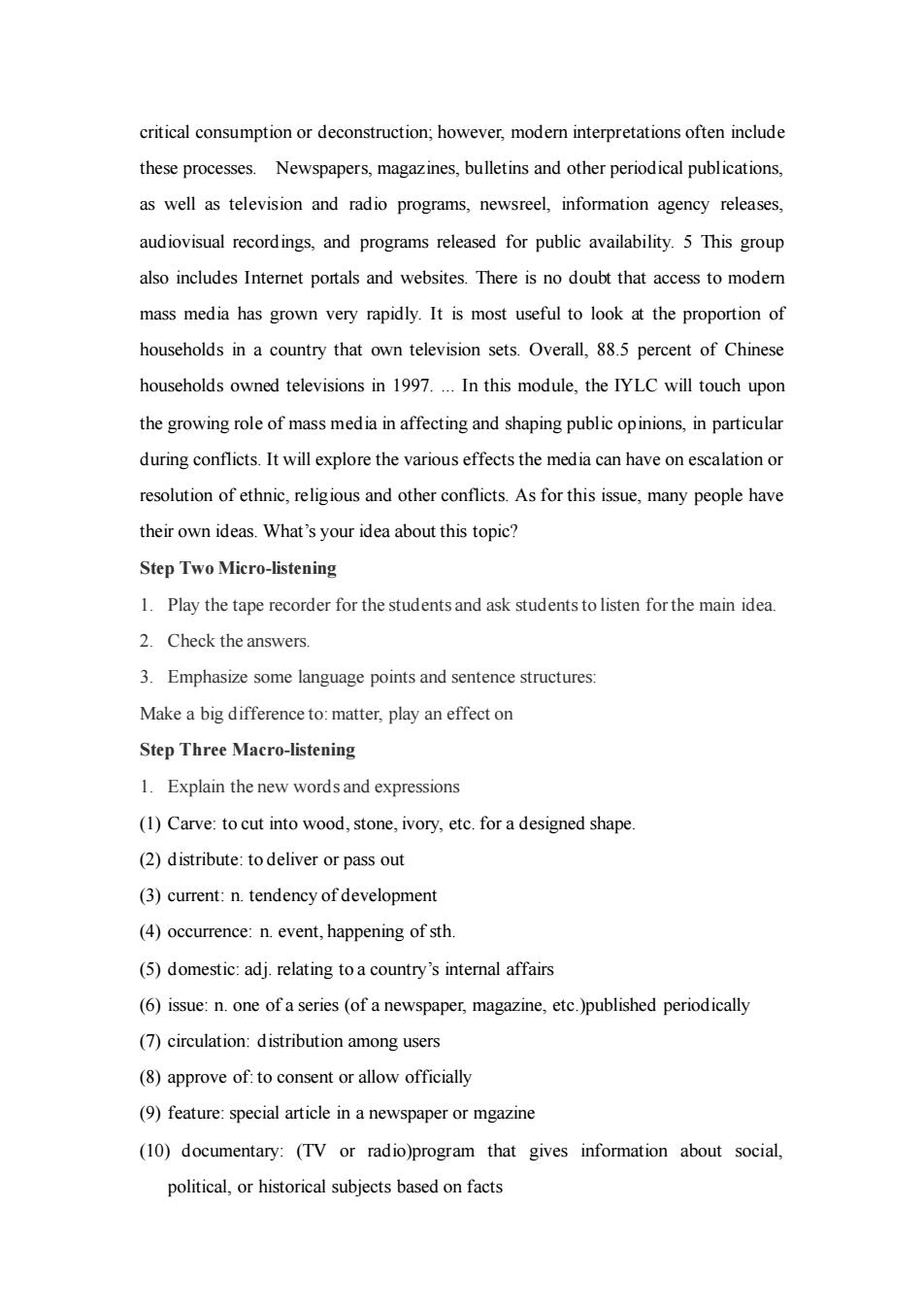
critical consumption or deconstruction;however,modern interpretations often include these processes.Newspapers,magazines,bulletins and other periodical publications as well as television and radio programs,newsreel,information agency releases. audiovisual recordings,and programs released for public availability.5 This group also includes Intemnet portals and websites.There is no doubt that access to modem mass media has grown very rapidly.It is most useful to look at the proportion of households in a country that own television sets.Overall,88.5 percent of Chinese households owned televisions in 1997..In this module.the IYLC will touch upon the growing role of mass media in affecting and shaping public opinions,in particular during conflicts.It will explore the various effects the media can have on escalation or resolution of ethnic,religious and other conflicts.As for this issue,many people have their own ideas.What's your idea about this topic? Step Two Micro-listening 1.Play the tape recorder for the studentsand ask studentstolisten for the main idea. 2.Check the answers. 3.Emphasize some language points and sentence structures: Make a big difference to:matter,play an effect on Step Three Macro-listening 1.Explain the new words and expressions (1)Carve:to cut into wood,stone,ivory,etc.for a designed shape (2)distribute:todeliver or pass out ()current:n.tendency of development (4)occurrence:n.event,happening of sth. (5)domestic:adj.relating toa country's intemal affairs (6)issue:n.one of a series (of a newspaper,magazine,etc.)published periodically (7)circulation:distribution among users (8)approve of:to consent or allow officially (9)feature:special article in a newspaper or mgazine (10)documentary:(TV or radio)program that gives information about social, political,or historical subjects based on facts
critical consumption or deconstruction; however, modern interpretations often include these processes. Newspapers, magazines, bulletins and other periodical publications, as well as television and radio programs, newsreel, information agency releases, audiovisual recordings, and programs released for public availability. 5 This group also includes Internet portals and websites. There is no doubt that access to modern mass media has grown very rapidly. It is most useful to look at the proportion of households in a country that own television sets. Overall, 88.5 percent of Chinese households owned televisions in 1997. ... In this module, the IYLC will touch upon the growing role of mass media in affecting and shaping public opinions, in particular during conflicts. It will explore the various effects the media can have on escalation or resolution of ethnic, religious and other conflicts. As for this issue, many people have their own ideas. What’s your idea about this topic? Step Two Micro-listening 1. Play the tape recorder for the students and ask students to listen for the main idea. 2. Check the answers. 3. Emphasize some language points and sentence structures: Make a big difference to: matter, play an effect on Step Three Macro-listening 1. Explain the new words and expressions (1) Carve: to cut into wood, stone, ivory, etc. for a designed shape. (2) distribute: to deliver or pass out (3) current: n. tendency of development (4) occurrence: n. event, happening of sth. (5) domestic: adj. relating to a country’s internal affairs (6) issue: n. one of a series (of a newspaper, magazine, etc.)published periodically (7) circulation: distribution among users (8) approve of: to consent or allow officially (9) feature: special article in a newspaper or mgazine (10) documentary: (TV or radio)program that gives information about social, political, or historical subjects based on facts
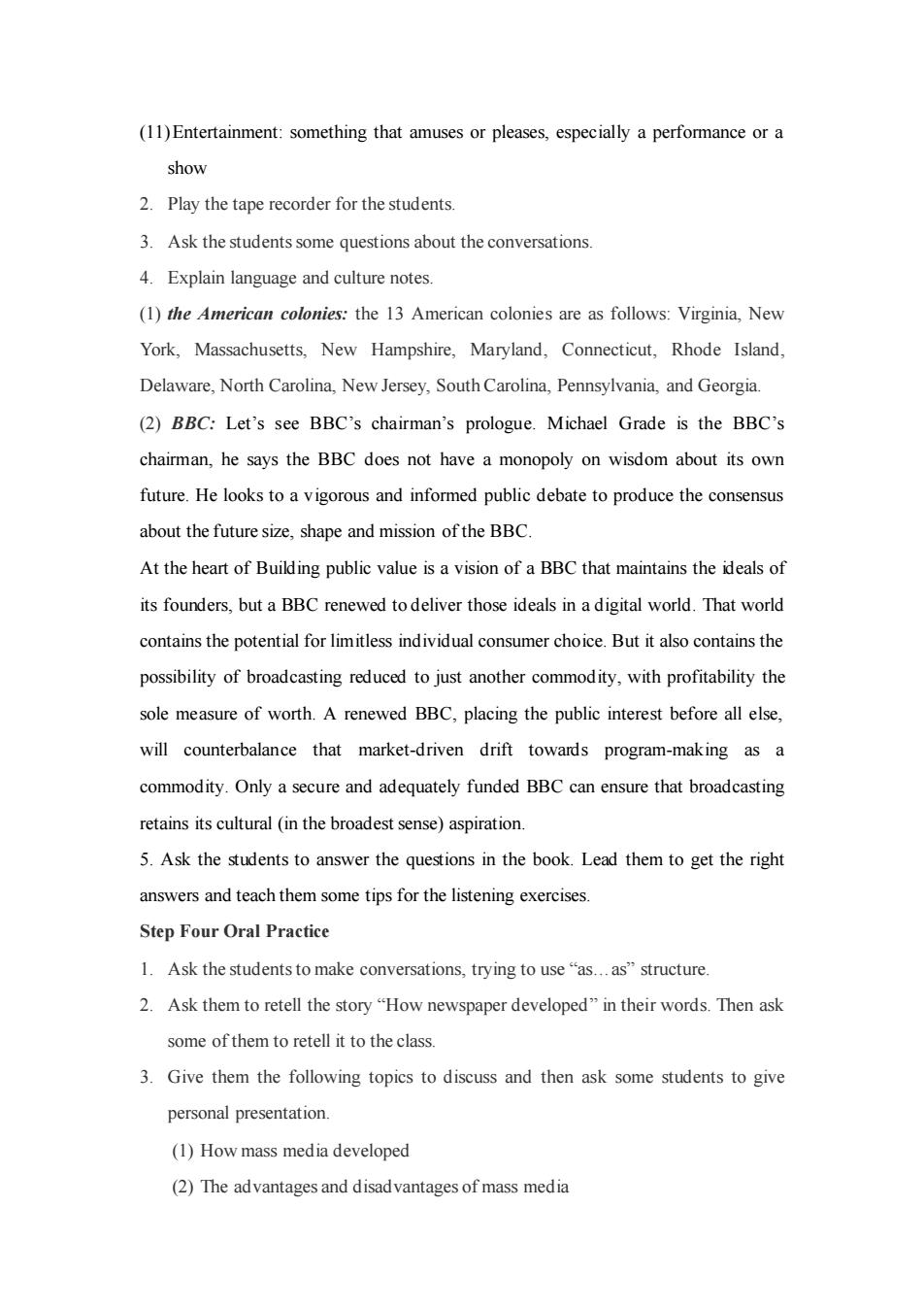
(11)Entertainment:something that amuses or pleases,especially a performance or a show 2.Play the tape recorder for the students. 3.Ask the students some questions about the conversations. 4.Explain language and culture notes. (1)the American colonies:the 13 American colonies are as follows:Virginia.New York,Massachusetts,New Hampshire,Maryland,Connecticut,Rhode Island Delaware,North Carolina,New Jersey,South Carolina,Pennsylvania,and Georgia. (2)BBC:Let's see BBC's chairman's prologue.Michael Grade is the BBC's chairman,he says the BBC does not have a monopoly on wisdom about its own future.He looks to a vigorous and informed public debate to produce the consensus about the future size,shape and mission of the BBC. At the heart of Builing public value is a vision of a BBC that maintains the ideals of its founders.but a BBC renewed todeliver those ideals in a digital world.That world contains the potential for limitless individual consumer choice.But it also contains the possibility of broadcasting reduced to just another commodity,with profitability the sole measure of worth.A renewed BBC,placing the public interest before all else, will counterbalance that market-driven drift towards program-making as a commodity.Only a secure and adequately funded BBC can ensure that broadcasting retains its cultural (in the broadest sense)aspiration. 5.Ask the students to answer the questions in the book.Lead them to get the right answers and teach them some tips for the listening exercises Step Four Oral Practice 1.Ask the students to make conversations,trying to use"as...as"structure. 2.Ask them to retell the story"How newspaper developed"in their words.Then ask some of them to retell it to the class. 3.Give them the following topics to discuss and then ask some students to give personal presentation. (1)How mass media developed (2)The advantages and disadvantages of mass media
(11)Entertainment: something that amuses or pleases, especially a performance or a show 2. Play the tape recorder for the students. 3. Ask the students some questions about the conversations. 4. Explain language and culture notes. (1) the American colonies: the 13 American colonies are as follows: Virginia, New York, Massachusetts, New Hampshire, Maryland, Connecticut, Rhode Island, Delaware, North Carolina, New Jersey, South Carolina, Pennsylvania, and Georgia. (2) BBC: Let’s see BBC’s chairman’s prologue. Michael Grade is the BBC’s chairman, he says the BBC does not have a monopoly on wisdom about its own future. He looks to a vigorous and informed public debate to produce the consensus about the future size, shape and mission of the BBC. At the heart of Building public value is a vision of a BBC that maintains the ideals of its founders, but a BBC renewed to deliver those ideals in a digital world. That world contains the potential for limitless individual consumer choice. But it also contains the possibility of broadcasting reduced to just another commodity, with profitability the sole measure of worth. A renewed BBC, placing the public interest before all else, will counterbalance that market-driven drift towards program-making as a commodity. Only a secure and adequately funded BBC can ensure that broadcasting retains its cultural (in the broadest sense) aspiration. 5. Ask the students to answer the questions in the book. Lead them to get the right answers and teach them some tips for the listening exercises. Step Four Oral Practice 1. Ask the students to make conversations, trying to use “as…as” structure. 2. Ask them to retell the story “How newspaper developed” in their words. Then ask some of them to retell it to the class. 3. Give them the following topics to discuss and then ask some students to give personal presentation. (1) How mass media developed (2) The advantages and disadvantages of mass media
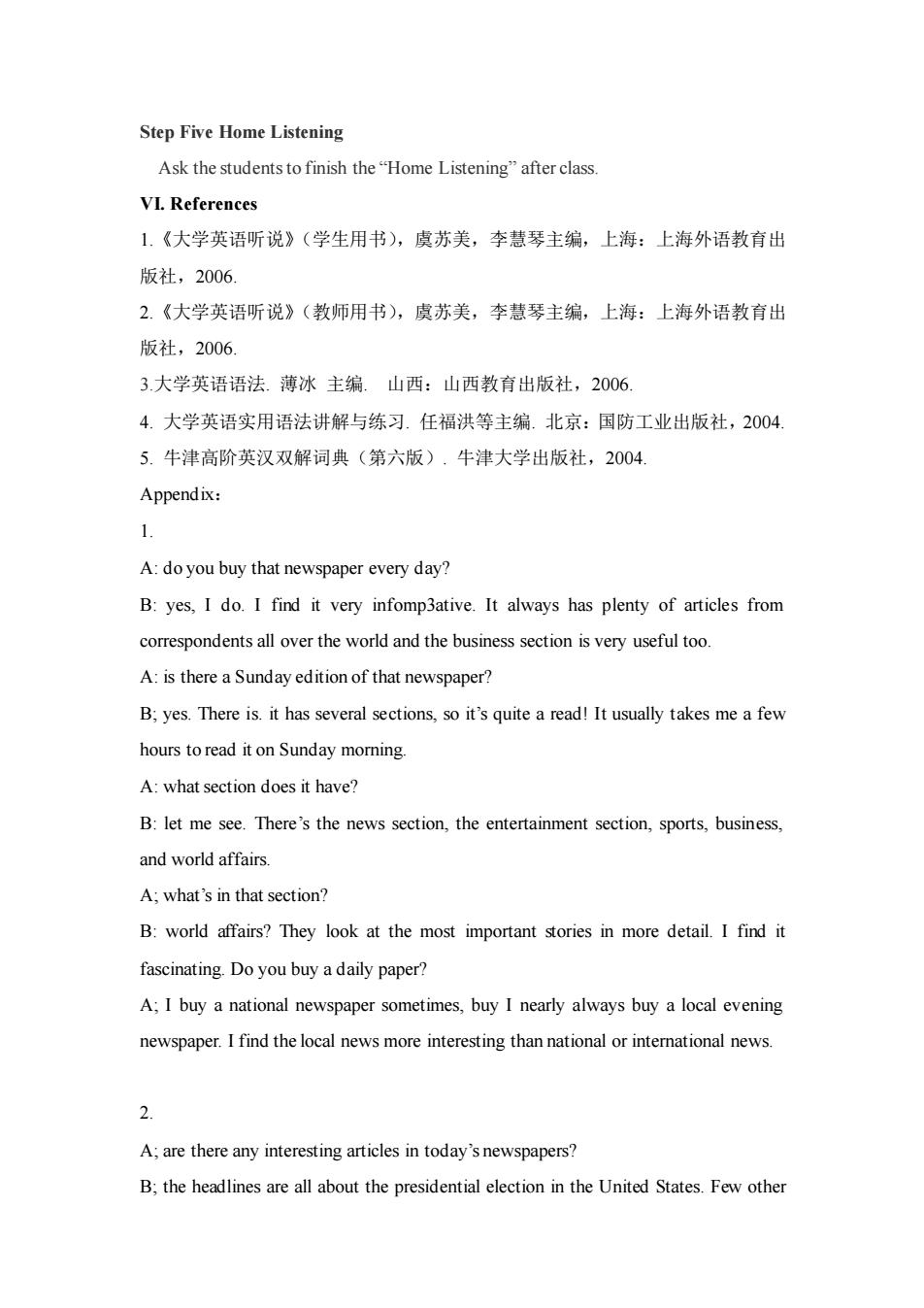
Step Five Home Listening Ask the students to finish the"Home Listening"after class VI.References 1.《大学英语听说》(学生用书),虞苏美,李慧琴主编,上海:上海外语教育出 版社,2006. 2.《大学英语听说》(教师用书),虞苏美,李慧琴主编,上海:上海外语教育出 版社,2006 3.大学英语语法.薄冰主编.山西:山西教育出版社,2006 4.大学英语实用语法讲解与练习.任福洪等主编.北京:国防工业出版社,2004 5.牛津高阶英汉双解词典(第六版),牛津大学出版社,2004. Appendix: A:do you buy that newspaper every day? B:yes,I do.I find it very infomp3ative.It always has plenty of articles from correspondents all over the world and the business section is very useful too. A:is there a Sunday edition of that newspaper? B:yes.There is.it has several sections,so it's quite a read!It usually takes me a few hours to read it on Sunday morning. A:what section does it have? B:let me see.There's the news section,the entertainment section,sports,business, and world affairs A:what's in that section? B:world affairs?They look at the most important stories in more detail.I find it fascinating.Do you buy adaily paper? A:I buy a national newspaper sometimes,buy I nearly always buy a local evening newspaper.I find the local news more interesting than national or international news. A:are there any interesting articles in today's newspapers? B:the headlines are all about the presidential election in the United States.Few other
Step Five Home Listening Ask the students to finish the “Home Listening” after class. VI. References 1.《大学英语听说》(学生用书),虞苏美,李慧琴主编,上海:上海外语教育出 版社,2006. 2.《大学英语听说》(教师用书),虞苏美,李慧琴主编,上海:上海外语教育出 版社,2006. 3.大学英语语法. 薄冰 主编. 山西:山西教育出版社,2006. 4. 大学英语实用语法讲解与练习. 任福洪等主编. 北京:国防工业出版社,2004. 5. 牛津高阶英汉双解词典(第六版). 牛津大学出版社,2004. Appendix: 1. A: do you buy that newspaper every day? B: yes, I do. I find it very infomp3ative. It always has plenty of articles from correspondents all over the world and the business section is very useful too. A: is there a Sunday edition of that newspaper? B; yes. There is. it has several sections, so it’s quite a read! It usually takes me a few hours to read it on Sunday morning. A: what section does it have? B: let me see. There’s the news section, the entertainment section, sports, business, and world affairs. A; what’s in that section? B: world affairs? They look at the most important stories in more detail. I find it fascinating. Do you buy a daily paper? A; I buy a national newspaper sometimes, buy I nearly always buy a local evening newspaper. I find the local news more interesting than national or international news. 2. A; are there any interesting articles in today’s newspapers? B; the headlines are all about the presidential election in the United States. Few other
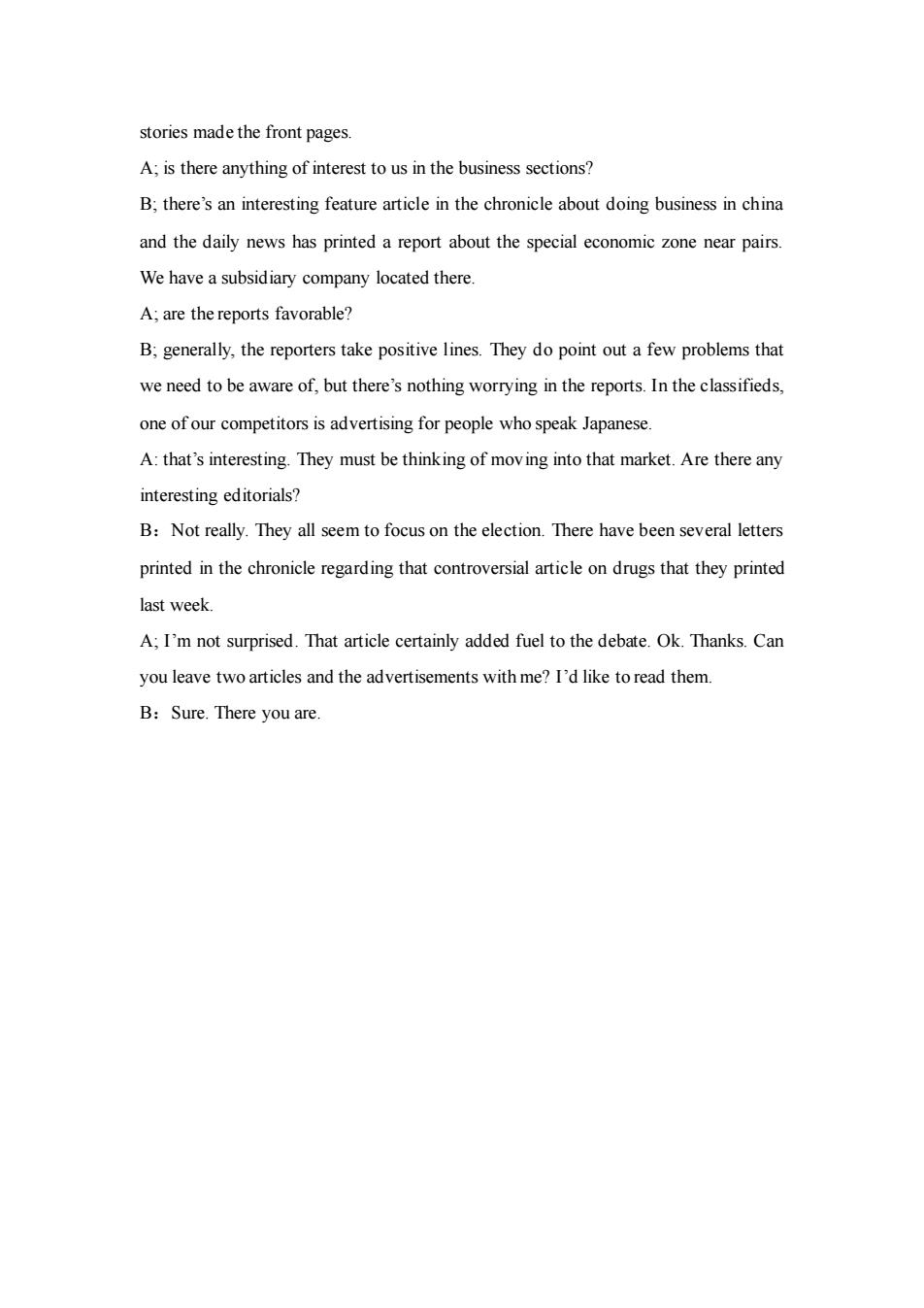
stories made the front pages. A;is there anything of interest to us in the business sections? B:there's an interesting feature article in the chronicle about doing business in china and the daily news has printed a report about the special economic zone near pairs. We have a subsidiary company located there. A;are the reports favorable? B:generally,the reporters take positive lines.They do point out a few problems that we need to be aware of,but there's nothing worrying in the reports.In the classifieds. one of our competitors is advertising for people who speak Japanese. A:that's interesting.They must be thinking of moving into that market.Are there any interesting editorials? B:Not really.They all seem to focus on the election.There have been several letters printed in the chronicle regarding that controversial article on drugs that they printed last week. A:I'm not surprised.That article certainly added fuel to the debate.Ok.Thanks.Can you leave two articles and the advertisements with me?I'd like to read them. B:Sure.There you are
stories made the front pages. A; is there anything of interest to us in the business sections? B; there’s an interesting feature article in the chronicle about doing business in china and the daily news has printed a report about the special economic zone near pairs. We have a subsidiary company located there. A; are the reports favorable? B; generally, the reporters take positive lines. They do point out a few problems that we need to be aware of, but there’s nothing worrying in the reports. In the classifieds, one of our competitors is advertising for people who speak Japanese. A: that’s interesting. They must be thinking of moving into that market. Are there any interesting editorials? B:Not really. They all seem to focus on the election. There have been several letters printed in the chronicle regarding that controversial article on drugs that they printed last week. A; I’m not surprised. That article certainly added fuel to the debate. Ok. Thanks. Can you leave two articles and the advertisements with me? I’d like to read them. B:Sure. There you are